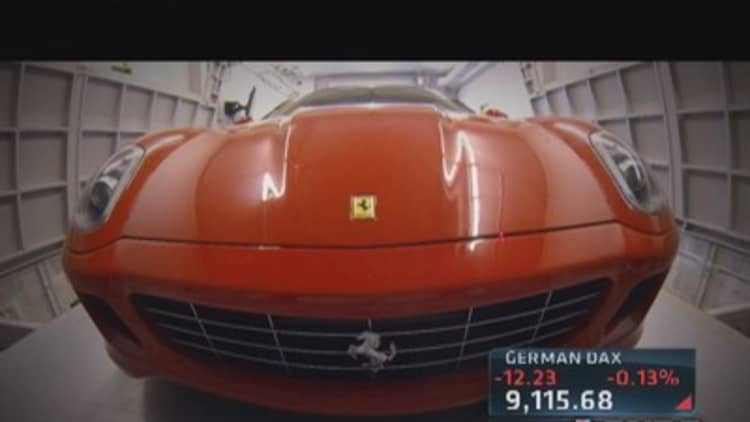Art often imitates stocks—at least when it comes to prices.
But so far this year, stock markets are down and art is up.
Consider this: The S&P 500 is down 3 percent or so in 2014. And this week it will be lucky to remain flat. Yet the markets for art and collectible cars are exploding.
(Read more: Luxury shoppers' influence on stocks)
At the London auctions this week, Sotheby's and Christie's reported record results for their sales.
Sotheby's two days of Impressionist, Modern and Surrealist sales racked up 215.8 million pounds (more than $345 million), the highest ever for a series in London. All its lots sold. The top was Camille Pissarro's 1897 painting "Boulevard Montmartre, Matinee de Printemps," which went for 19.7 million euros (about $32 million)—nearly double its top presale estimate.
Christie's had a good week, too, selling Juan Gris' 1915 still life "The Checked Tablecloth" for $56.7 million. The previous record for a Gris was $28 million. The Impressionist and Modern evening sale totaled $288 million.
Collectible cars are also on a tear. A 1957 Ferrari Testarossa sold in Britain this week for $40 million. And a series of auctions in Paris set a spate of new records for certain cars. RM Auctions gaveled down on a 1955 Jaguar D-Type for about $5 million.
(Read more: $40 million Ferrari sets record)
Bonham's sold a 1968 Ferrari 275 GTB/4 Berlinetta for $3 million to an Asian buyer.

There are two explanations for why stocks are sagging and collectibles are surging.
One is that, unaffected by market gyrations, the superwealthy would buy rare items no matter what the S&P is doing. The other is that stock market volatility is driving more money into the collectibles market. Next to stocks, Ferraris and Picassos look safe.
The wealthy were getting nervous about stock prices in the fall, and their skepticism would have only deepened with the swings since the beginning of the year.
(Read more: Can you be addicted to wealth?)
For now, they may want to buy assets they view as more secure—and certainly more fun and enjoyable to own.
If there's a bigger selloff, however, the notoriously illiquid collectibles market may not be quite so safe.
—By CNBC's Robert Frank. Follow him on Twitter @robtfrank.
Watch "Secret Lives of the Super Rich", Wednesdays, at 9 p.m. ET/PT. http://superrich.cnbc.com.


